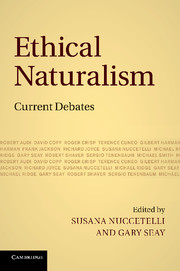Book contents
- Frontmatter
- Contents
- Contributors
- Introduction
- Chapter 1 Naturalism in moral philosophy
- Chapter 2 Normativity and reasons: five arguments from Parfit against normative naturalism
- Chapter 3 Naturalism: feel the width
- Chapter 4 On ethical naturalism and the philosophy of language
- Chapter 5 Metaethical pluralism: how both moral naturalism and moral skepticism may be permissible positions
- Chapter 6 Moral naturalism and categorical reasons
- Chapter 7 Does analytical moral naturalism rest on a mistake?
- Chapter 8 Supervenience and the nature of normativity
- Chapter 9 Can normativity be naturalized?
- Chapter 10 Ethical non-naturalism and experimental philosophy
- Chapter 11 Externalism, motivation, and moral knowledge
- Chapter 12 Naturalism, absolutism, relativism
- Bibliography
- Index
Chapter 5 - Metaethical pluralism: how both moral naturalism and moral skepticism may be permissible positions
Published online by Cambridge University Press: 05 January 2012
- Frontmatter
- Contents
- Contributors
- Introduction
- Chapter 1 Naturalism in moral philosophy
- Chapter 2 Normativity and reasons: five arguments from Parfit against normative naturalism
- Chapter 3 Naturalism: feel the width
- Chapter 4 On ethical naturalism and the philosophy of language
- Chapter 5 Metaethical pluralism: how both moral naturalism and moral skepticism may be permissible positions
- Chapter 6 Moral naturalism and categorical reasons
- Chapter 7 Does analytical moral naturalism rest on a mistake?
- Chapter 8 Supervenience and the nature of normativity
- Chapter 9 Can normativity be naturalized?
- Chapter 10 Ethical non-naturalism and experimental philosophy
- Chapter 11 Externalism, motivation, and moral knowledge
- Chapter 12 Naturalism, absolutism, relativism
- Bibliography
- Index
Summary
Introduction: some distinctions
This paper concerns the relation between two metaethical theses: moral naturalism and moral skepticism. It is important that we distinguish both from a couple of methodological principles with which they might be confused. Let us give the label “Cartesian skepticism” to the method of subjecting to doubt everything for which it is possible to do so – usually by introducing alternative hypotheses that are consistent with all available evidence (e.g., brains in vats). Let us give the label “global naturalism” to the principle that requires of any item which we admit into our ontology that it “fits” (in some manner or cluster of manners to be specified) with our naturalistic scientific worldview. One might be both a Cartesian skeptic and a global naturalist, if the latter principle is something that has survived the former test procedure. Alternatively, one might have adopted global naturalism for some other reason, while having little patience with the Cartesian method of doubt.
Moral naturalism is the metaethical view that moral entities (e.g., properties like goodness and evil) fit within the scientific image of the world. The moral naturalist will probably be a global naturalist, but need not be: it is consistent with allowing non-natural entities into one’s ontology that one happens to think that moral properties are of the natural variety.
Keywords
- Type
- Chapter
- Information
- Ethical NaturalismCurrent Debates, pp. 89 - 109Publisher: Cambridge University PressPrint publication year: 2011
- 1
- Cited by

